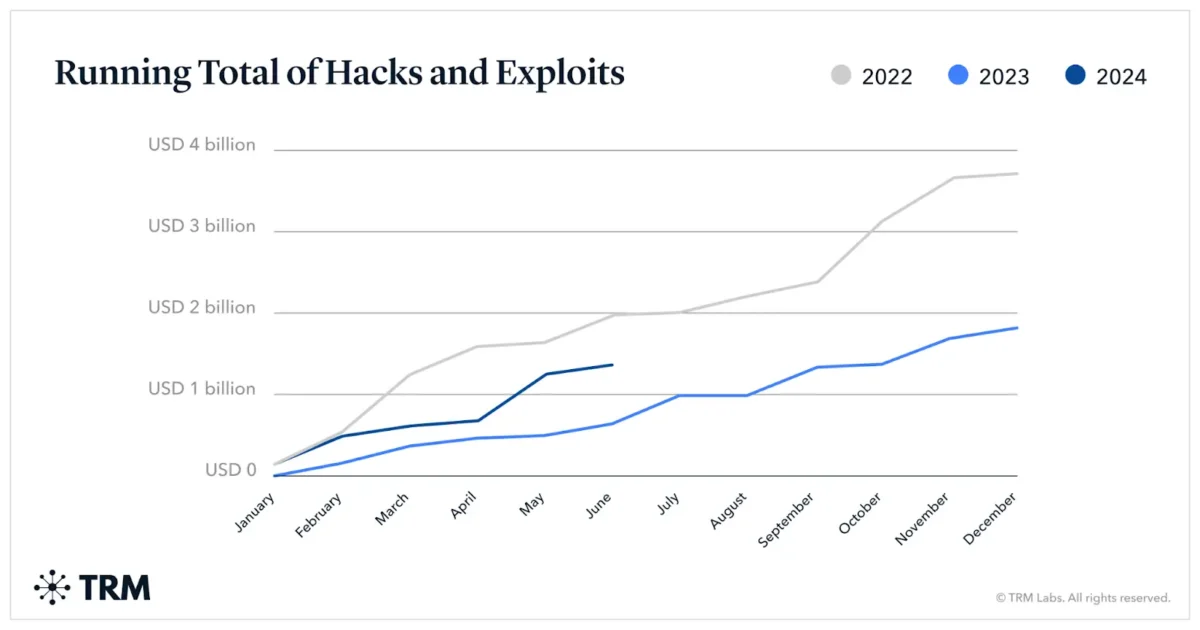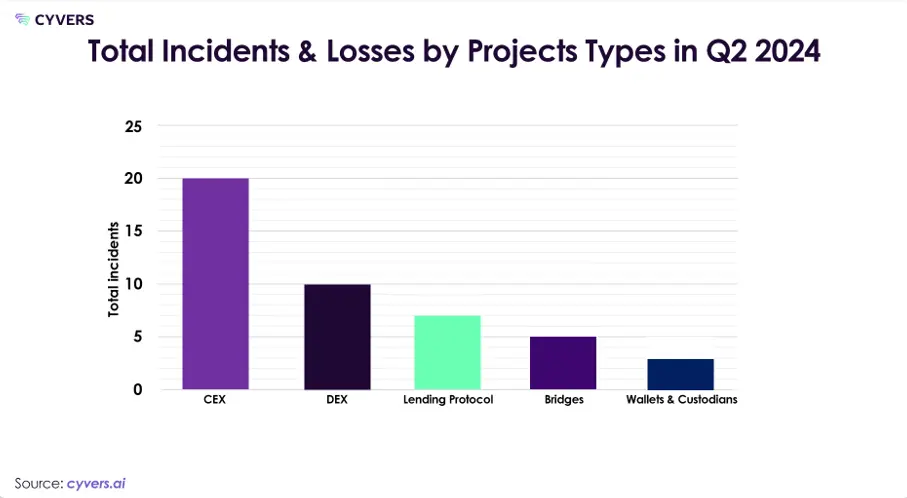In the first half of 2024, the number of cybercrimes in the crypto sphere rapidly increased. In particular, the latest data from TRM Labs shows that the amount stolen by hackers in six months is almost twice as much as last year. The report says that between 1 January and 24 June this year, $1.38 billion worth of cryptocurrency was stolen, compared to $657 million in the same period last year.
Running Total Of Hacks and Exploits
The company’s analysts note that, as of 2023, a small amount of large hacker attacks accounted for the vast majority of stolen money. In particular, the five largest hacks and exploits took 70% of the total amount stolen this year. According to TRM Labs, the main attack vectors in 2024 will be the compromise of private keys and seed phrases.
The largest attack of the year was on the Japanese crypto exchange DMM Bitcoin in May. As a result, more than 4,500 BTC were stolen, which at the time amounted to more than $300 million.
For this purpose, hackers used stolen private keys or “address poisoning”. In these cases, the attackers send a small amount of cryptocurrency from a wallet with an address similar to yours or the recipient’s to trick the victim into sending funds to the wrong wallet. After all, crypto addresses are long and complex strings of characters that are difficult to remember or enter manually without making mistakes.
Read Also: Enhancing Ethereum: Vitalik Buterin’s Approach to Faster Blockchain Transactions
TRM Labs analysts also noted that they do not observe any fundamental changes in the security of the crypto sphere that could explain this growth trend. However, they also found no significant differences in the vectors or number of attacks between the first half of 2023 and 2024. However, the company pointed out that the average price of tokens has increased significantly over the past six months compared to the same period last year, which probably contributed to the increase in the number of thefts.

Source: TRM Labs
TRM Labs emphasizes the importance of implementing a multi-layered security strategy, such as regular security audits, strong encryption, multi-signature wallets, and secure coding methods. The best defense against potential hacks is to take a comprehensive approach that includes several security measures that complement each other.
Therefore, when choosing a cryptocurrency exchange that you can trust, security should always be the main factor to consider. In 2021, cybersecurity consulting company Hacken compiled a list of the most secure companies on the market. It includes well-known exchanges such as Cryptology, Kraken, and WhiteBIT with a top rating of 10, Coinbase with 9,51, Crypto with 9,35, and more.
Hackers Shifted from DeFi to CeFi
Experts from the Cyvers platform also spoke about a sharp increase in cryptocurrency losses due to cyberattacks in the second quarter and first half of 2024 in their report. According to their data, the losses amounted to $630 million, and the volume of stolen assets from centralized exchanges (CEX) increased by 900% compared to the same period in 2023.
Analysts note that 49 separate incidents have been recorded over the past two months. The amount of losses for the first half of 2024 reached $1.38 billion. For comparison, they pointed out that hackers stole $1.7 billion in the whole of 2023.
Read Also: The Bitcoin Block Size War: Vitalik Buterin’s Perspective
They also identified the most popular types of attacks, including smart contract exploits – $67.4 million; access control breaches and phishing – $491.3 million; and address poisoning – $71.5 million.
However, Cyvers emphasizes that despite the increase in the number of attacks, recovery efforts, and incident response strategies have improved, which indicates the need for constant vigilance and strict security measures.
Separately, experts noted a noticeable change in the attack vector.
“This quarter has witnessed a significant shift in attack vectors, with centralized exchanges (CEX) bearing the brunt of major incidents, while decentralized finance (DeFi) protocols show improved resilience,” the report stated.

Source: cyvers.ai
Finally, taking into account the trends of the second quarter, the Cyvers team predicts several threats that may appear in the future. Namely, an increase in the number of hacker attacks on Layer 2 solutions, as well as the active use of artificial intelligence technologies in illegal network raids. Analysts also see significant risks for gaming platforms and the non-fungible token segment.
Localised AI Models are Key to Preventing Future Hacks
Following the recent OpenAI hack, Tether CEO Paolo Ardoino said on his X account that artificial intelligence models should be localized to protect people and their privacy. He noted that this would also ensure the models’ resilience and independence.
Ardoino pointed to the latest technologies such as smartphones and laptops, saying that they contain enough power to “fine tune general large language models (LLMs) with user’s data, preserving enhancements locally to the device.”
Additionally, Ardoino told Cointelegraph that locally executed AI models are a “paradigm shift” in terms of user privacy and independence.
“By running directly on the user’s device, be it a smartphone or laptop, these models eliminate the need for third-party servers. This not only ensures that data stays local, enhancing security and privacy, but also allows for offline use,” he said.
In March, Tether announced its expansion into AI, to which Ardoino replied that the company was “actively exploring” the integration of locally executable models into its AI solutions.
Summary
During the first half of 2024, the number of cybercrimes in the crypto sphere increased sharply, reaching $1.38 billion, which is almost twice as much as in the same period last year. According to TRM Labs, most of the attacks are aimed at compromising private keys and poisoning addresses. The hacking of the Japanese crypto exchange DMM Bitcoin caused significant losses, where more than 4,500 BTC were stolen. Cyvers’ analysis shows that losses due to attacks on centralized exchanges have increased by 900%. Despite the increase in the number of attacks, experts emphasize the need for multi-level protection.
Read Also: Bitcoin Faces Selling Pressure as Mt. Gox Begins Internal Coin Movements
